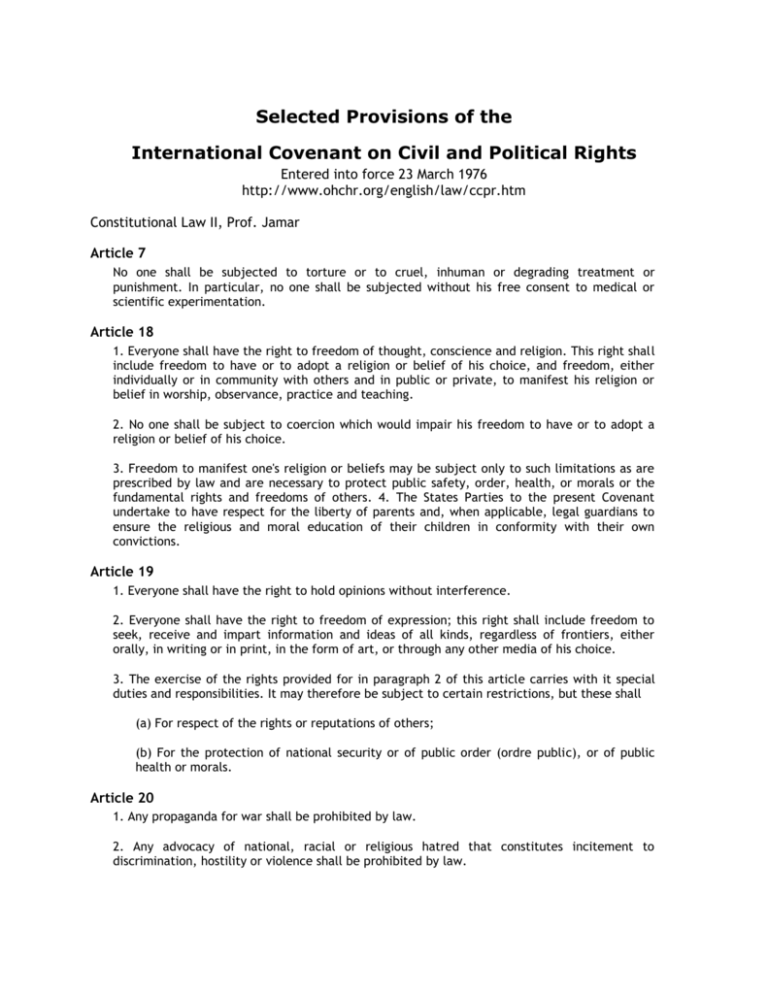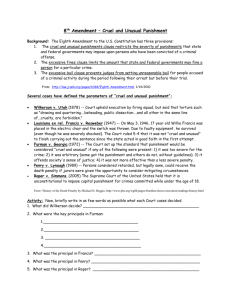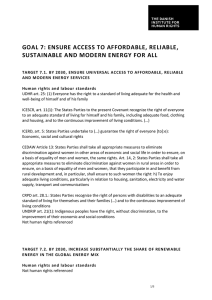iccpr - Prof. Jamar's Homepage
advertisement

Selected Provisions of the International Covenant on Civil and Political Rights Entered into force 23 March 1976 http://www.ohchr.org/english/law/ccpr.htm Constitutional Law II, Prof. Jamar Article 7 No one shall be subjected to torture or to cruel, inhuman or degrading treatment or punishment. In particular, no one shall be subjected without his free consent to medical or scientific experimentation. Article 18 1. Everyone shall have the right to freedom of thought, conscience and religion. This right shall include freedom to have or to adopt a religion or belief of his choice, and freedom, either individually or in community with others and in public or private, to manifest his religion or belief in worship, observance, practice and teaching. 2. No one shall be subject to coercion which would impair his freedom to have or to adopt a religion or belief of his choice. 3. Freedom to manifest one's religion or beliefs may be subject only to such limitations as are prescribed by law and are necessary to protect public safety, order, health, or morals or the fundamental rights and freedoms of others. 4. The States Parties to the present Covenant undertake to have respect for the liberty of parents and, when applicable, legal guardians to ensure the religious and moral education of their children in conformity with their own convictions. Article 19 1. Everyone shall have the right to hold opinions without interference. 2. Everyone shall have the right to freedom of expression; this right shall include freedom to seek, receive and impart information and ideas of all kinds, regardless of frontiers, either orally, in writing or in print, in the form of art, or through any other media of his choice. 3. The exercise of the rights provided for in paragraph 2 of this article carries with it special duties and responsibilities. It may therefore be subject to certain restrictions, but these shall (a) For respect of the rights or reputations of others; (b) For the protection of national security or of public order (ordre public), or of public health or morals. Article 20 1. Any propaganda for war shall be prohibited by law. 2. Any advocacy of national, racial or religious hatred that constitutes incitement to discrimination, hostility or violence shall be prohibited by law. Article 22 1. Everyone shall have the right to freedom of association with others, including the right to form and join trade unions for the protection of his interests. 2. No restrictions may be placed on the exercise of this right other than those which are prescribed by law and which are necessary in a democratic society in the interests of national security or public safety, public order (ordre public), the protection of public health or morals or the protection of the rights and freedoms of others. This article shall not prevent the imposition of lawful restrictions on members of the armed forces and of the police in their exercise of this right. 3. Nothing in this article shall authorize States Parties to the International Labour Organisation Convention of 1948 concerning Freedom of Association and Protection of the Right to Organize to take legislative measures which would prejudice, or to apply the law in such a manner as to prejudice, the guarantees provided for in that Convention. Article 26 All persons are equal before the law and are entitled without any discrimination to the equal protection of the law. In this respect, the law shall prohibit any discrimination and guarantee to all persons equal and effective protection against discrimination on any ground such as race, colour, sex, language, religion, political or other opinion, national or social origin, property, birth or other status. International Covenant on Civil and Political Rights United States of America Reservations: (1) That article 20 does not authorize or require legislation or other action by the United States that would restrict the right of free speech and association protected by the Constitution and laws of the United States. (2) That the United States reserves the right, subject to its Constitutional constrains, to impose capital punishment on any person (other than a pregnant woman) duly convicted under existing or future laws permitting the imposition of capital punishment, including such punishment for crimes committed by persons below eighteen years of age. (3) That the United States considers itself bound by article 7 to the extent that `cruel, inhuman or degrading treatment or punishment' means the cruel and unusual treatment or punishment prohibited by the Fifth, Eighth, and/or Fourteenth Amendments to the Constitution of the United States. (4) That because U.S. law generally applies to an offender the penalty in force at the time the offense was committed, the United States does not adhere to the third clause of paragraph 1 of article 15. (5) That the policy and practice of the United States are generally in compliance with and supportive of the Covenant's provisions regarding treatment of juveniles in the criminal justice system. Nevertheless, the United States reserves the right, in exceptional circumstances, to treat juveniles as adults, notwithstanding paragraphs 2 (b) and 3 of article 10 and paragraph 4 of article 14. The United States further reserves to these provisions with respect to States with respect to individuals who volunteer for military service prior to age 18. Understandings: (1) That the Constitution and laws of the United States guarantee all persons equal protection of the law and provide extensive protections against discrimination. The United States understands distinctions based upon race, colour, sex, language, religion, political or other opinion, national or social origin, property, birth or any other status - as those terms are used in article 2, paragraph 1 and article 26 - to be permitted when such distinctions are, at minimum, rationally related to a legitimate governmental objective. The United States further understands the prohibition in paragraph 1 of article 4 upon discrimination, in time of public emergency, based `solely' on the status of race, colour, sex, language, religion or social origin, not to bar distinctions that may have a disproportionate effect upon persons of a particular status. [additional understandings and declarations omitted]








